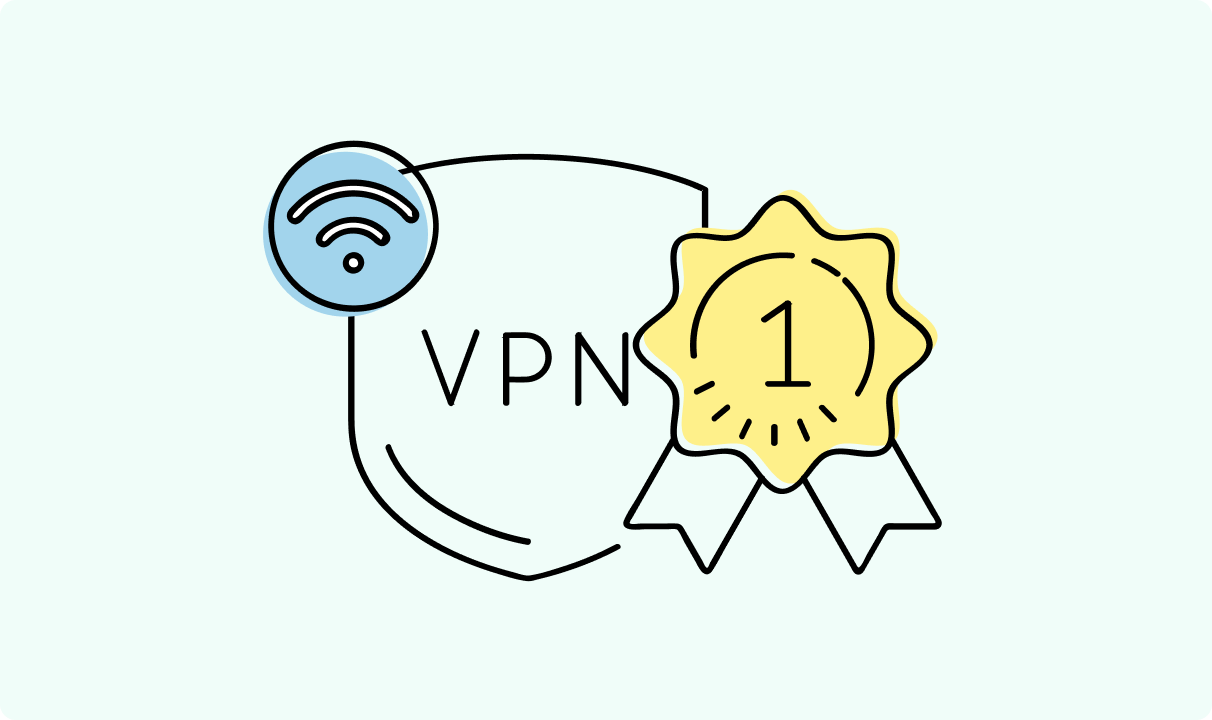Decentralized VPN: Explained and Compared
The internet is at risk of being merged into small clusters owned by a few individuals. So, many turn to decentralization as a remedy.
You get more privacy when one provider can't control the means of your communication, web hosting, social media access, or other services. A decentralized VPN tests this idea for a secure internet connection.
Unlike traditional centralized VPNs, there is no single entity controlling the servers. Instead, requests are routed through multiple devices. Does this approach work with VPNs, or do you risk exposing your data even more?

Guoda Šulcaitė
5 min read
Introduction to Decentralized VPNs
A decentralized VPN (dVPN, for short) runs on a network of distributed nodes operated by other volunteers in the same network. As with traditional VPN providers, your internet traffic is encrypted, and your IP address is hidden, but the means of achieving it differ. So, why use VPN that is decentralized?
Rather than relying on one server to handle your data, a decentralized network is used where each volunteer can access the data to some extent. Distributed Ledger Technologies (DLTs), such as blockchain, implement transparency among participants.
Independent users run their own devices, usually home computers, to host a node that acts as a VPN provider handling requests. Often, volunteers are rewarded with cryptocurrency for contributing to the VPN service, but issues of VPN not connecting still remain.
The idea is to eliminate the control one actor might have when creating a secure internet connection for others. In theory, it minimizes the risk of data leaks and ISP or government interference.
In practice, however, due to the open nature of a decentralized VPN network, new security risks are created. Many of these threats are invisible to a casual consumer.
How Do Decentralized VPNs Work?
From the user's perspective, a dVPN and a VPN service don't differ much. Your money goes to users who rent out their IP addresses instead of a company, but that's about it.
You get to install software to connect, choose locations, encrypt your traffic, and even get some other security features. As with traditional VPNs, most decentralized VPN services also cost fixed subscriptions.
On a more technical level, decentralized VPNs are closer to peer-to-peer (P2P) networks, where devices with equal permissions are linked together. Open-source dVPN protocols are used to create rules for routing, tunneling, and encryption.
The latter works a bit differently than with a traditional VPN provider and is an outlier in the history of encryption. Instead of encrypting data and sending it through one server, dVPNs can divide data packets and distribute them among multiple nodes in the network.
In such a way, encryption is decentralized at the expense of performance. However, it isn't layered as in the Tor network, so it's still the same protection as with a traditional VPN service provider.
Any device can become a node by acting as a small temporary server in a decentralized network. In fact, many devices on such networks are users and contributors at the same time.
When a device becomes the last exit node, its IP address is used to conceal the original requester. Due to the P2P nature of a decentralized VPN service, such nodes are public and visible to anyone online.
Advantages of Decentralized VPNs
- Censorship resistance. The main advantage of dVPNs is that they are easier to use in countries where VPNs are outlawed. It's more difficult for governments to spy on or shut down decentralized VPN providers.
- Decentralized logs. While technically, your usage data is kept, there is no server storing it all. Logs are mixed with other users and spread out over the network.
- Lower risk of centralized breaches. There's no one service provider that hackers need to breach for user data. However, smaller network infiltration and data breaches are still possible.
- Location targeting and encryption. Just like a traditional VPN provider, a dVPN will allow you to choose locations and encrypt your data.
- Earning possibilities. You can earn some Cryptocurrency if you are willing to turn your home device into a decentralized VPN node.
Decentralized VPNs VS Traditional VPNs
While dVPNs have advantages, it's clear they aren't a silver bullet for privacy when compared to conventional VPNs. As seen in the table below, most of what a dVPN accomplishes, a traditional VPN service provider does better.
Conventional VPN | Decentralized VPN | |
|---|---|---|
| Ownership | One provider takes care of the server's performance and maintenance. | A P2P network of volunteers with their home devices. |
| Location Targeting | Constant selection of global locations. | Locations might be limited to what volunteers are available. |
| Privacy and Encryption | High-end encryption and a no-logs policy are standard with quality providers such as CometVPN. | Decentralized logs. Encryption is run on one concurrent device at a time. |
| Performance | Depends on how close you are to the VPN server, with multiple options to choose from. | Varies based on volunteer devices available as their quality and proximity differ. |
| Convenience | Providers do their best to improve the ease of use and customer support. | Might require technical know-how as the infrastructure is made for enthusiasts. |
| Security | More reliable, although there's a risk of centralized attacks. | Reduced risk of centralized attacks but vulnerable to bad actors infiltrating. |
| Price | Monthly subscription with multiple payment options available. | Monthly subscriptions in cryptocurrencies or running local nodes as a payment. |
| Use Cases | Best for conveniently ensuring privacy and network security. | Best in regions with severe internet censorship. |
Applications of Decentralized VPNs
A conventional VPN should be your preferred option for daily privacy needs, but it doesn't mean that dVPNs don't have their own applications. There are at least two scenarios where a decentralized VPN should be considered as one of the top options.
As an alternative to a free VPN
It's known that free VPNs should be avoided. At best, you'll be bombarded with ads, and at worst, you might get your data leaked. A decentralized VPN might be a better alternative for those on a shoestring budget.
Potentially, you can contribute to a dVPN network to fund your VPN needs. If you participate in the network enough, the earnings and costs will even out, and you'll get an almost free dVPN. Of course, if you want performance closer to the best residential VPN providers, this isn't an option.
High censorship countries
Perhaps the most popular reason for using a decentralized VPN is to protect yourself better from authoritarian governments. Are VPNs legal in such countries is beside the point, as activists and journalists use decentralized solutions because they are more difficult to take down.
It should be noted that most decentralized VPN providers do not use multi-layered encryption, and only one node is used at a time. So, the Tor network, although with similar performance drawbacks, might still be a better choice.
Legal and Ethical Considerations
There's nothing wrong with routing and encrypting internet traffic from your device. It might even be a profitable side hustle earning you cryptocurrency. If done right, security risks are minimal, but ethical and legal concerns remain.
Where there's money, there are bad actors tricking people. Their schemes apply to decentralized VPN networks quite well. Mobile apps and other software are created with the intent to use devices as nodes for a dVPN service provider.
Sometimes, the permission is hidden in overly complicated terms and conditions, which is unethical at the very least. In extreme cases, routing your internet traffic through them might even be illegal. The nodes for a decentralized VPN might be created using malware.
These are rare cases and probably more of an exception than a rule, but you can never be sure as a user. A centralized VPN provider can be audited and tested, but a decentralized VPN service doesn't have one authority to take full responsibility.
That's why dVPNs are a double-edged sword. On the one hand, they are more difficult to censor and take down. On the other, you can never know how your VPN IP address was sourced and whether it's infiltrated.
Conclusion
Decentralized VPN providers are functioning with good intentions, but the decision ultimately rests on credibility. Will you entrust your data to hundreds of volunteers handling it for crypto gain, or is it better to go with one legitimate service provider? The choice is yours to make.

Author
Guoda Šulcaitė
Growth Manager at CometVPN
Guoda is an all-round marketing professional with deep knowledge in the tech SaaS industry, particularly VPNs and proxies. She has worked on numerous projects and helped achieve impressive results through project management, content production, and SEO.
Related articles

4 min read
Best Residential VPN Providers in 2025
A Virtual Private Network (VPN) encrypts your traffic and hides your IP address. The way these functions are accomplished affects various aspects of your online privacy and security.
Here, we'll consider using residential IP addresses instead of those originating from a data center. A residential VPN has advantages compared to traditional ones, but there are some caveats. It all boils down to residential VPN providers.
The worst ones may even create more risks than benefits. We'll end this article with a list of the best residential VPN providers on the market.

Guoda Šulcaitė
4 min read
Ethernet vs Wi-Fi: Which One is Better?
Ethernet and Wi-Fi are the two main ways to connect your computer to the internet. While Wi-Fi has received significantly more attention in recent years, especially among consumers, due to its simplicity and flexibility, ethernet is still widely used in various other applications.
Even if Wi-Fi is significantly more popular, it isn’t strictly better. Both methods have their benefits and drawbacks. Wi-Fi’s popularity comes from its ease-of-use and flexibility, but an ethernet connection can be much more useful in certain scenarios.

Adomas Šulcas

5 min read
How to Change Chrome Proxy Settings: The Ultimate Guide
A proxy server is an easy alternative to a VPN that can perform most of the functions of the latter. It’s a server that stands between your device and the destination server, taking your connection requests and forwarding them in your name.
Destination servers in almost all cases see the proxy server as the originator of the request. As such, proxies are widely used in various, mostly business-related applications whenever privacy, security, location changing, and several other factors are at play.

Guoda Šulcaitė